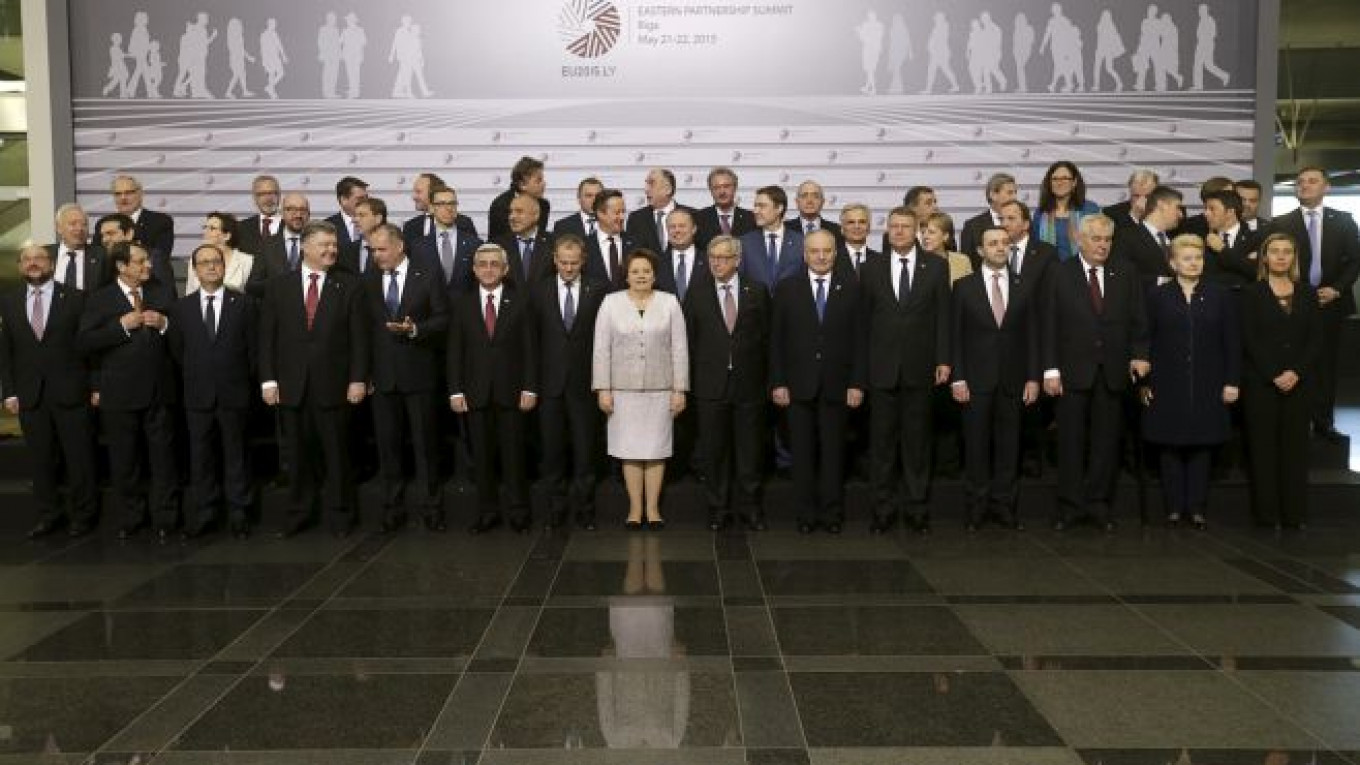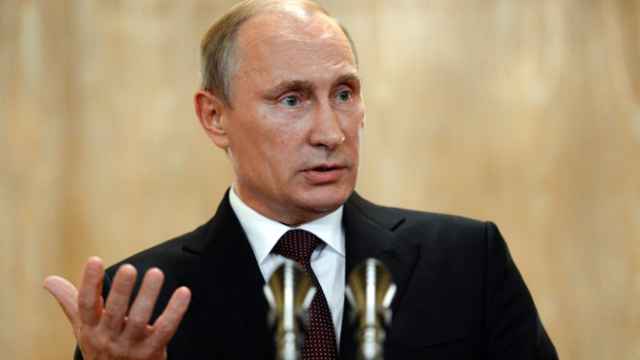The recent EU Eastern Partnership Summit in Riga, Latvia, can be summed up in one word: disappointment. Georgia, Moldova and Ukraine face considerable hardships — including economic pressure from Russia and the threat of military confrontation — in their quest to deepen their ties to the European Union.
And yet Europe's leaders remain fixated on technicalities that basically amount to rejection, reflected in their refusal to permit visa-free travel to the European Union for Ukrainian and Georgian citizens. At this point, the EU's equivocations have become so frustrating that they are undermining support for European integration.
In Georgia, the country where support for European and Euro-Atlantic integration has historically been the most solid, a recent poll showed that 31 percent of respondents supported joining Russian President Vladimir Putin's pet project, the Eurasian Economic Union (EEU) — up from 16 percent just one year ago. Though support for Georgia's continued pursuit of closer ties with the EU remains much higher, at 68 percent, Georgian Europhiles are alarmed by the shift.
Increased support for EEU membership could stem from rising frustration with the EU's lukewarm attitude toward further enlargement. It might also be driven by the intensification of Russian propaganda, despite the truly bizarre nature of some of its claims, such as that EU membership will turn Georgians into homosexuals.
But discussions in local social networks, and my own conversations with my fellow Georgians, suggest that the most compelling reason for the country's increasing vacillation on EU membership lies in Ukraine.
The fact is that Ukraine made a clear choice in favor of Europe over Russia — and was punished severely. Russia annexed part of its territory, while Europe watched. Putin may be dangerous and unpredictable, but he does not hesitate to do what it takes to advance his understanding of Russia's strategic interests. The EU policies, by contrast, have lately been characterized by indecision and weakness.
To be sure, the issue is not that Georgians prefer Russia. On the contrary, a substantial majority consider Russia to be a threat. In supporting the EEU, they are submitting to Russia's hard power. It is better to feed a bear than to confront it on one's own.
Of course, hard power has never been the EU's main strength. On the contrary, the EU's commitment to using its extensive soft power is what enabled it to assert its influence over a large chunk of the former Soviet bloc. But, in a tough neighborhood, some promise of protection against naked military aggression is also needed. The EU did not offer this to Ukraine; Georgians (and others) have taken note.
The EU's failure in this regard owes much to the initial ease of its eastward enlargement. Its leaders came to believe that any European country would fundamentally transform itself in order to build ties — however limited — to the EU. And they naively assumed that the mere dream of one day joining the EU would ensure countries' loyalty, even in the face of Putin's hard-power threats. In short, Europeans seem to have convinced themselves that they had transcended geopolitical realities.
But the truth is that hard power was always central to the appeal of European integration, with the former Soviet bloc countries considering the EU and NATO to be two sides of the same coin. Indeed, Europe's soft power was based on the promise of freedom, prosperity and security. Europeans simply preferred to downplay the security component, because it was outsourced to NATO, and thus dependent on the United States.
That preference is even stronger today, when America's pivot toward Asia is weakening the transatlantic axis. After all, the EU has no alternative security mechanism. If the 2008 war between Russia and Georgia did not adequately highlight the EU's waning security credentials, the ongoing crisis in Ukraine certainly has. Eastern European countries are now rethinking the actual benefits — and costs — of integration.
The EU can recover its soft power in its eastern neighborhood only if it recovers its hard power. In theory, it could do this without the United States; in practice, it does not stand a chance.
The unique value of the European order consists in its recognition and protection of the right of small and vulnerable states to make meaningful choices about their future. This is precisely the principle that today's Russia, which lacks soft power, views as a threat. Putin knows that few countries, if any, would reject the EU and align themselves with Russia if given a genuinely free choice. Even Belarus could not be taken for granted in such a scenario.
European leaders understand this, which is why they have repeatedly declared that all European countries have the right to choose their own path. But such pronouncements mean little, given the EU's refusal to take action to uphold that right. By appearing spineless in the face of Russian aggression that has been aimed specifically at derailing European influence, the EU has lost credibility.
To win it back, the EU must back its word with deeds. Though designing an effective response to Russian aggression will not be easy, the EU's much-vaunted soft power depends on it.
Ghia Nodia is president of the Caucasus Institute for Peace, Democracy, and Development in Tbilisi, Georgia. © Project Syndicate, 2015.
A Message from The Moscow Times:
Dear readers,
We are facing unprecedented challenges. Russia's Prosecutor General's Office has designated The Moscow Times as an "undesirable" organization, criminalizing our work and putting our staff at risk of prosecution. This follows our earlier unjust labeling as a "foreign agent."
These actions are direct attempts to silence independent journalism in Russia. The authorities claim our work "discredits the decisions of the Russian leadership." We see things differently: we strive to provide accurate, unbiased reporting on Russia.
We, the journalists of The Moscow Times, refuse to be silenced. But to continue our work, we need your help.
Your support, no matter how small, makes a world of difference. If you can, please support us monthly starting from just $2. It's quick to set up, and every contribution makes a significant impact.
By supporting The Moscow Times, you're defending open, independent journalism in the face of repression. Thank you for standing with us.
Remind me later.






